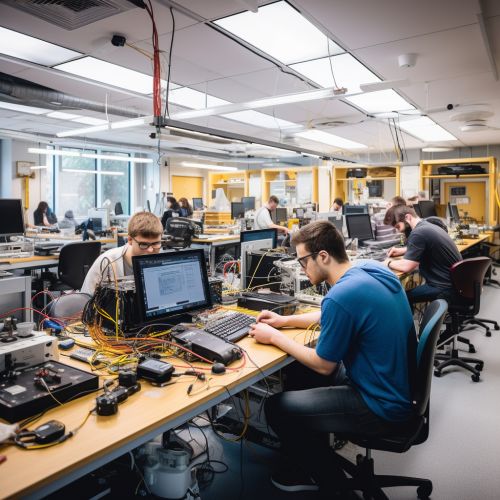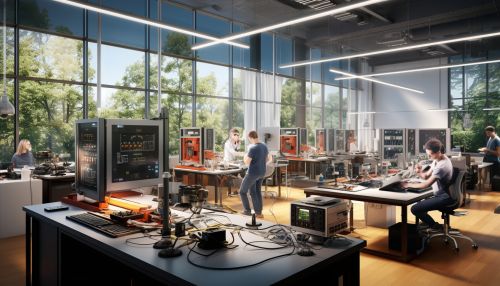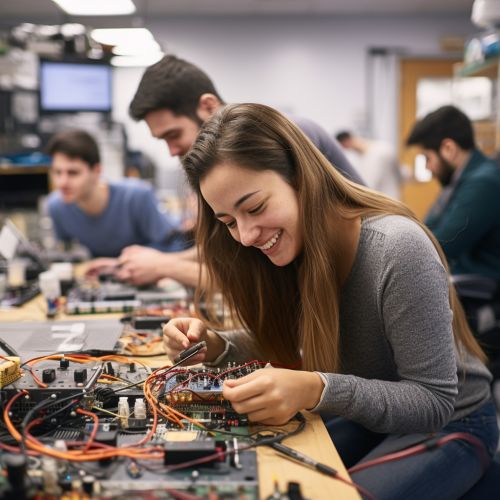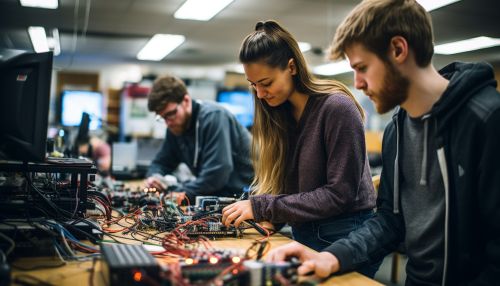Computer Science Students Utilizing Electronics and Communication Engineering Laboratory
Introduction
Computer Science (CS) students often utilize the facilities of an Electronics and Communication Engineering (ECE) laboratory. This interdisciplinary approach provides a comprehensive understanding of both hardware and software aspects of computing systems. The ECE laboratory is equipped with various electronic devices, communication systems, and testing equipment that are essential for the practical application of theoretical knowledge gained in CS courses.


Importance of Electronics and Communication Engineering Laboratory for CS Students
The ECE laboratory plays a crucial role in the education of CS students. It provides a hands-on learning environment where students can apply the theoretical concepts learned in their CS courses. The laboratory is equipped with various electronic devices and communication systems, which are essential for understanding the hardware aspects of computing systems.
In the ECE laboratory, CS students can experiment with microprocessors, microcontrollers, and other hardware components. They can learn how these components interact with software to perform various tasks. This practical knowledge is crucial for designing and developing efficient software and hardware systems.
Utilization of ECE Laboratory by CS Students
CS students utilize the ECE laboratory in various ways. They use the laboratory for practical sessions, project work, and research activities. The laboratory provides a conducive environment for learning and experimenting with various electronic devices and communication systems.
Practical Sessions
Practical sessions in the ECE laboratory allow CS students to gain hands-on experience with various electronic devices and communication systems. These sessions are usually conducted under the supervision of a faculty member or a laboratory technician. During these sessions, students perform various experiments that help them understand the functioning of electronic devices and communication systems.
Project Work
The ECE laboratory is also used by CS students for project work. Students work on various projects that involve the design and development of hardware and software systems. These projects provide students with an opportunity to apply the theoretical knowledge gained in their CS courses. They also help students develop problem-solving skills and creativity.
Research Activities
CS students also use the ECE laboratory for research activities. They conduct research on various topics related to electronics and communication engineering. The laboratory provides them with the necessary equipment and resources for their research. This helps them contribute to the advancement of knowledge in the field of computer science and electronics and communication engineering.
Benefits of Utilizing ECE Laboratory for CS Students
Utilizing the ECE laboratory provides several benefits for CS students. It enhances their understanding of the hardware aspects of computing systems. It provides them with practical experience, which is crucial for their future careers. It also helps them develop important skills such as problem-solving, creativity, and teamwork.


Enhanced Understanding of Hardware Aspects
By utilizing the ECE laboratory, CS students can enhance their understanding of the hardware aspects of computing systems. They can learn how electronic devices and communication systems work. This knowledge is crucial for designing and developing efficient hardware and software systems.
Practical Experience
The ECE laboratory provides CS students with practical experience. They can experiment with various electronic devices and communication systems. This hands-on experience is crucial for their future careers as it helps them understand the practical applications of the theoretical concepts learned in their CS courses.
Skill Development
Utilizing the ECE laboratory also helps CS students develop important skills. They learn problem-solving skills as they tackle various challenges during their practical sessions and project work. They also develop creativity as they design and develop innovative hardware and software systems. Moreover, they learn teamwork skills as they work together on various projects.
Conclusion
The utilization of the ECE laboratory by CS students is crucial for their education. It provides them with a hands-on learning environment where they can apply the theoretical concepts learned in their CS courses. It also helps them develop important skills such as problem-solving, creativity, and teamwork. Therefore, the ECE laboratory plays a vital role in the education of CS students.
